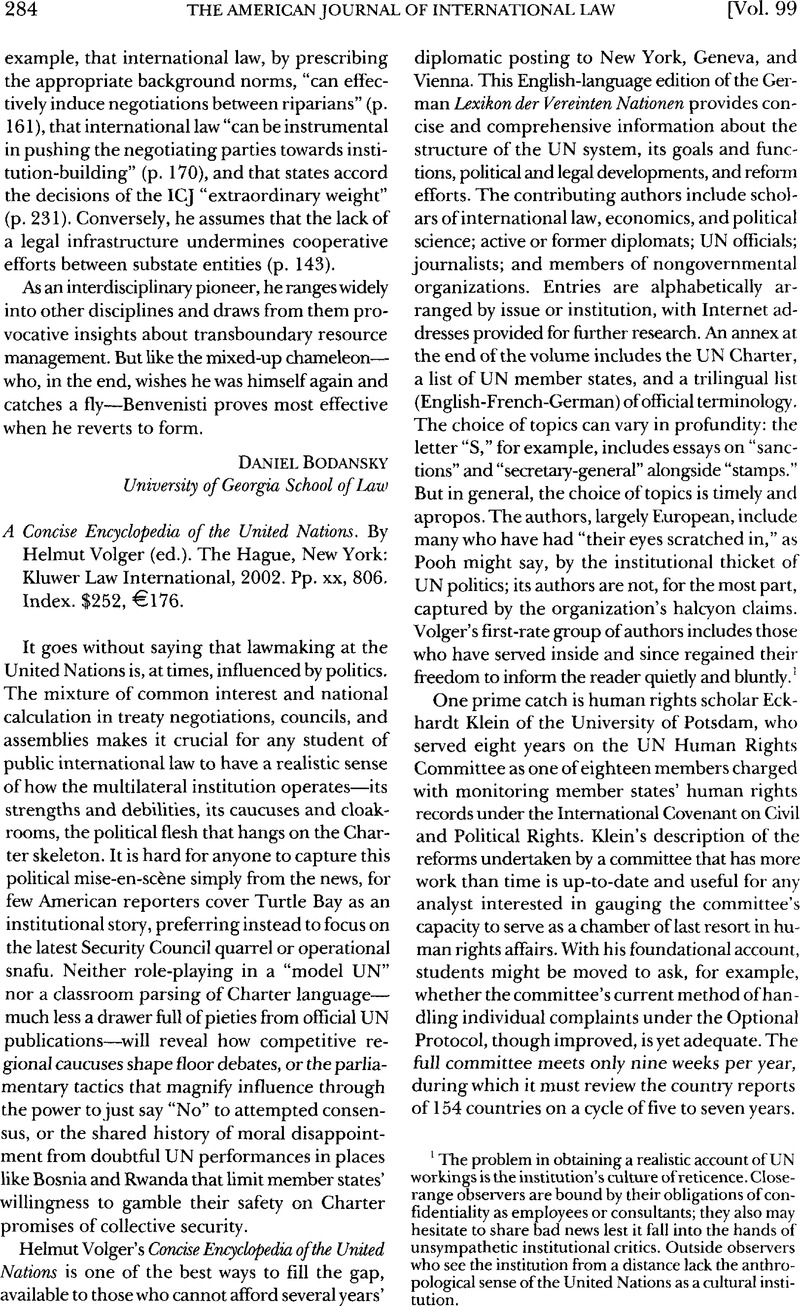No CrossRef data available.
Article contents
A Concise Encyclopedia of the United Nations. By Helmut Volger (ed.). The Hague, New York: Kluwer Law International, 2002. Pp. xx, 806. Index. $252, €176.
Published online by Cambridge University Press: 27 February 2017
Abstract

- Type
- Recent Books on International Law
- Information
- Copyright
- Copyright © American Society of International Law 2005
References
1 The problem in obtaining a realistic account of UN workings is the institution’s culture of reticence. Closerange observers are bound by their obligations of confidentiality as employees or consultants; they also may hesitate to share bad news lest it fall into the hands of unsympathetic institutional critics. Outside observers who see the institution from a distance lack the anthropological sense of the United Nations as a cultural institution.
2 This dilemma may become more acute now that the Human Rights Committee has asserted the right to review the performance of member states that fail to file formal reports.
3 A story from the not-so-distant past, perhaps too sensitive even for the encyclopedia, records that coordination was sometimes counterproductive: the former High Commissioner for Refugees Sadako Ogata lost access to one or more conflict areas when the former high commissioner for human rights issued public statements of condemnation on the eve of Ogata’s planned visits.
4 A More Secure World: Our Shared Responsibility: Report of the Secretary-General’s High-Level Panel on Threats, Challenges And Change 79-83 (2004), available at <http://www.un.org/secureworld/>.
5 This innovation by Venezuelan diplomat Diego Arria allows Council members to reconvene informally to talk to nonstate actors, especially important when later decisions and demands of the Council might be addressed to those very actors.
6 The Western European and Others Group (WEOG)—to which the United States, Canada, Australia, and New Zealand also belong—finally admitted Israel as a member in 2000. But the membership was initially “temporary” and Israel was at first barred from presenting candidates for open seats in UN political bodies located in New York. Though these conditions have been lifted, WEOG still refuses to admit Israel to its deliberations in Geneva, Vienna, and Nairobi, thus preventing its full part in UN discussions held in these fora. The late high commissioner for human rights, Sergio Vieira de Mello, told the Geneva coordinators of WEOG and the European Union in 2003 that he hoped both groups would “find it possible” to admit Israel into WEOG, but no action was taken.
7 One wishes Urquhart had included a citation to his own captivating memoir, A Life in Peace and War (1987).
8 The first OIOS leader was Karl-Theodor Paschke, a German diplomat who carried out the work with great vigor, including the first referral for criminal prosecution ever made by the United Nations against an employee.
9 Report of the Secretary-General Pursuant to General Assembly Resolution 53/35: The Fall of Srebrenica, UN Doc. A/54/549 (1999)..




